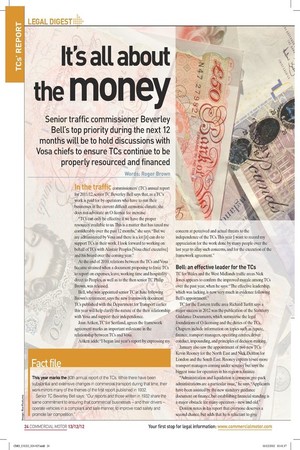It's all about the mone
Page 16

Page 17

If you've noticed an error in this article please click here to report it so we can fix it.
Senior traffic commissioner Beverley Bell's top priority during the next 12 months will be to hold discussions with Vosa chiefs to ensure TCs continue to be properly resourced and financed n the traffic commissioners' (TC) annual report for 2011/12, senior TC Beverley Bell says that, as a TC's work is paid for by operators who have to run their businesses in the current difficult economic climate, she does not advocate an 0-licence fee increase.
"TCs can only be effective if we have the proper resources available to us. This is a matter that has taxed me considerably over the past 12 months," she says. "But we are administered by Vosa and there is a lot [it] can do to support TCs in their work. I look forward to working on behalf of TCs with Alastair Peoples [Vosa chief executive] and his board over the coming year."
At the end of 2010, relations between the TCs and Vosa became strained when a document proposing to force TCs to report on expenses, leave, working time and hospitality direct to Peoples, as well as to the then senior TC Philip Brown, was released.
Bell, who was appointed senior TC in June following Brown's retirement, says the new framework document TCs published with the Department for Transport earlier this year will help clarify the nature of the their relationship with Vosa and support their independence.
Joan Aitken, TC for Scotland, agrees the framework agreement marks an important milestone in the relationship between TCs and Vosa.
Aitken adds: "I began last year's report by expressing my concern at perceived and actual threats to the independence of the TCs. This year I want to record my appreciation for the work done by many people over the last year to allay such concerns, and for the execution of the framework agreement."
Bell: an effective leader for the TCs TC for Wales and the West Midlands traffic areas Nick Jones appears to confirm the improved morale among TCs over the past year, when he says: "The effective leadership, which was lacking, is now very much in evidence following Bell's appointment."
TC for the Eastern traffic area Richard Turfitt says a major success in 2012 was the publication of the Statutory Guidance Documents, which summarise the legal foundations of 0-licensing and the duties of the TCs. Chapters include information on topics such as repute, finance, transport managers, operating centres, driver conduct, impounding, and principles of decision making January also saw the appointment of two new TCs: Kevin Rooney for the North East and Nick Denton for London and the South East. Rooney expects to see more transport managers coming under scrutiny but says the biggest issue for operators in his region is finance.
"Administration and liquidation is common; pre-pack administrations are a particular issue," he says. "Applicants have been assisted by the new statutory guidance document on finance, but establishing financial standing is a major obstacle for many operators — new and old."
Denton notes in his report that everyone deserves a second chance, but adds that he is reluctant to give operators the fourth, fifth and sixth chances he believes some of them appear to consider necessary.
He says: "I have also been struck in the first few weeks of my post by the number of transport managers coming before me, with a CPC dating back some years, who have almost no knowledge of recent legislation and what they are required to do.
"It is akin to finding an electrician who does not know how to wire a plug, he adds.
TC for the Western traffic area Sarah Bell, who was given special responsibility for road transport regulation during the Olympics, notes that the increase in out-ofhours delivery slots in and around London during the Games, along with the related Code of Practice, provides an excellent opportunity to take the initiative forward post-Games.
In Aitken's view, operators north of the border continue to range from the highly compliant to the downright criminal.
She adds: "Too many wrong answers are given to questions on application forms; for example, people self-servingly awarding themselves rehabilitation as offenders, when in truth they should have declared jail sentences. Too many people continue to use operator licence discs long after their businesses have gone. I see many instances of new entities created in the months ahead of an HMRC writ for unpaid taxes."
"In a very bad example this year a family attempted to continue in haulage by presenting forged documents to my office. Again the genuineness of transport manager arrangements raised its head in many cases." Senior TC Bell concludes: "The past 12 months has been a turbulent time, but despite this TCs have achieved a great deal." • 0-LICENCES BY NUMBERS • The number of new 0-licences issued in 2011/12 was 4,833, down from 5,233 in 2010/11.
• A total of 322 0-licences were revoked last year, compared with 365 the previous year.
• There were 97 licence suspensions in 2011/12, compared to 83 in the previous 12 months.
• The TCs imposed 206 curtailments or conditions on licences in 2011/12 — down on the 252 of the previous year.
• A formal warning was issued in 253 cases in 2011/12, compared with 335 in 2010/11.
-11 TCs issued 37 disqualifications on licence holders last year, a slight increase on the 35 imposed the year before.
• A total of 37 transport managers have lost their repute in the last year — down on the previous figure of 52.
Iik This year marks the 80th annual report of the TCs. While there have been substantial and extensive changes in commercial transport during that time, their work mirrors many of the themes of the first report published in 1932.
Senior TO Beverley Bell says: "Our reports and those written in 1932 share the same commitment to ensuring that commercial businesses — and their drivers — operate vehicles in a compliant and safe manner, to improve road safety and promote fair competition."








































